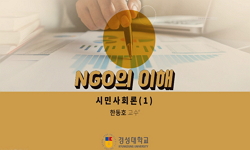An active role on the part of NGOs is now widely seen as urgently needed to control chronic corruption in Korea. Indeed, major Korean civic organizations like the Citizens` Coalition for Economic Justice, People`s Solidarity for Participatory Democrac...
http://chineseinput.net/에서 pinyin(병음)방식으로 중국어를 변환할 수 있습니다.
변환된 중국어를 복사하여 사용하시면 됩니다.
- 中文 을 입력하시려면 zhongwen을 입력하시고 space를누르시면됩니다.
- 北京 을 입력하시려면 beijing을 입력하시고 space를 누르시면 됩니다.

시민단체에 의한 부패통제: 논리, 유형, 분석 = Corruption Control by Civil Movement Organizations: Justification, Typology, and Analysis
한글로보기https://www.riss.kr/link?id=A40118666
- 저자
- 발행기관
- 학술지명
- 권호사항
-
발행연도
2003
-
작성언어
-
- 주제어
-
KDC
300
-
등재정보
KCI우수등재
-
자료형태
학술저널
- 발행기관 URL
-
수록면
95-117(23쪽)
- 제공처
- 소장기관
-
0
상세조회 -
0
다운로드
부가정보
다국어 초록 (Multilingual Abstract)
An active role on the part of NGOs is now widely seen as urgently needed to control chronic corruption in Korea. Indeed, major Korean civic organizations like the Citizens` Coalition for Economic Justice, People`s Solidarity for Participatory Democracy, and Transparency International-Korea have contributed significantly to corruption control in various ways, including participation in anti-corruption policy-making. influencing public opinion, and engaging in protest activities. This stuey aims to explore the justifications for NGO intervention, to create a corruption typology, and to analyze the major NGOs` anti-corruption activities. Six justifications and six types of corrupt practices among government, firms, and individuals are identified. It is also found that the NGOs` anti-corruption strategies regarding government, while well-designed and effective, have been limited by a lack of human resources and insufficient information.
동일학술지(권/호) 다른 논문
-
- 한국행정학회
- 이송호 ( Lee Song Ho )
- 2003
- KCI우수등재
-
- 한국행정학회
- 김경주 ( Kim Gyeong Ju )
- 2003
- KCI우수등재
-
- 한국행정학회
- 박희봉 ( Park Hui Bong )
- 2003
- KCI우수등재
-
거버넌스의 실험: 네트워크조직의 이론과 실제 -대청호살리기운동본부를 중심으로-
- 한국행정학회
- 배응환 ( Bae Eung Hwan )
- 2003
- KCI우수등재




 KISS
KISS





